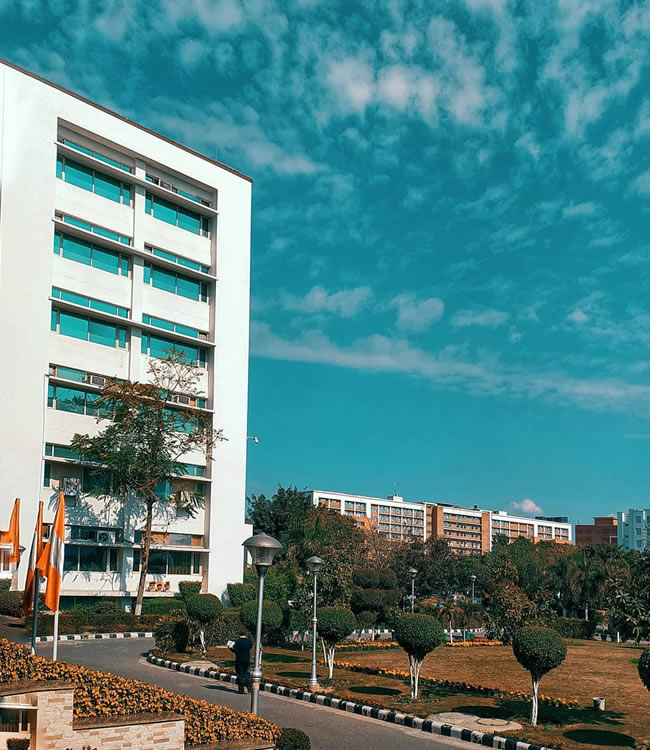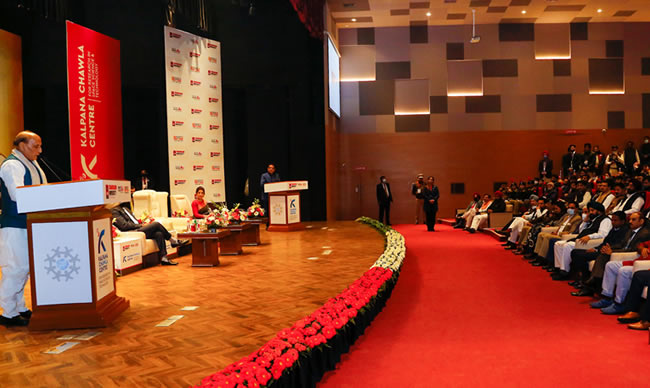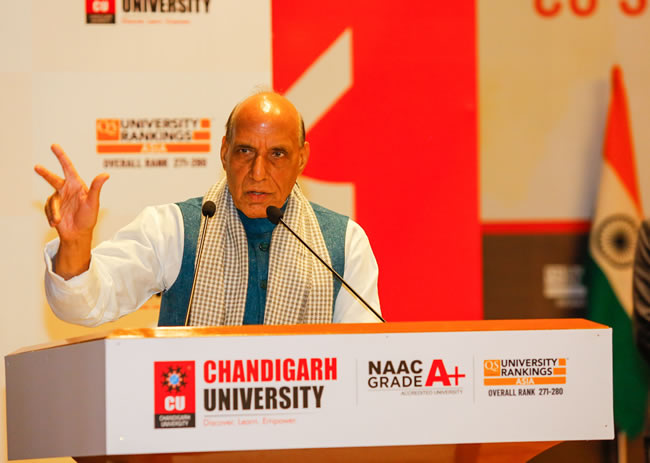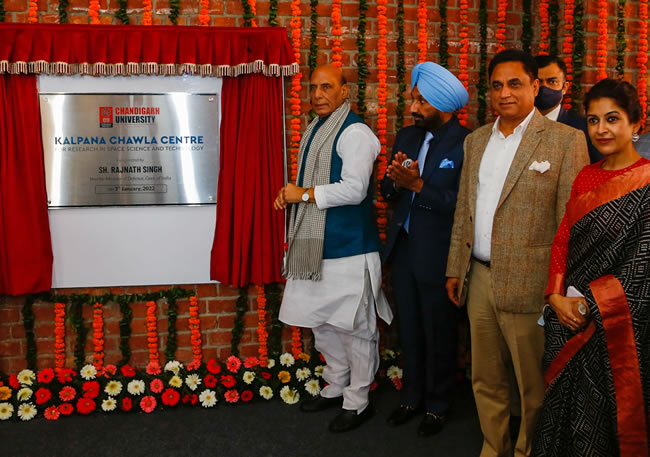« Best Wishes for 2022! | Main | University Grants Commission (UGC), India, asks all Academic Institutions to accept Digital Format Degrees/Certificates presented through "DigiLocker" as Valid. »
January 3, 2022
Defence Minister of India, Rajnath Singh, inaugurates Kalpana Chawla Centre for Research in Space Science & Technology at Chandigarh University.
Defence Minister terms it as an essential step towards strengthening the space sector.
Launches Defence Scholarship Scheme worth Rs 10 Crore for wards of defence personnel
Calls for long term public-private partnership to make India a knowledge economy
Chandigarh University’s ‘CUSAT’ to be one of the 75 student-made satellites launched as a part of Amrut Mahotsav.



Photos: The Union Minister for Defence, Shri Rajnath Singh, addressed the gathering during the inauguration of the Kalpana Chawla Centre for Research in Space Science & Technology at Chandigarh University, in Punjab, on January 03, 2022.

Photo: The Union Minister for Defence, Shri Rajnath Singh, inaugurating the Kalpana Chawla Centre for Research in Space Science & Technology at Chandigarh University, in Punjab on January 03, 2022.
Chandigarh, India, January 3, 2022 — Defence Minister of India, Rajnath Singh, inaugurated Kalpana Chawla Centre for Research in Space Science & Technology (KCCRSST) at Chandigarh University today. He also launched a Scholarship Scheme worth Rs 10 crore for the wards of Defence Personnel of the three Services.
In his address, Shri Rajnath Singh described the establishment of the Research Centre as an essential step towards strengthening the country’s space sector by stressing that it is only through these efforts that India can become a leader in future technologies. He likened the KCCRSST with ‘Pride of India’ Kalpana Chawla, hoping that this research facility would touch new heights of success, similar to the remarkable achievements of the late India-born astronaut who brought universal recognition to her country of origin.
Underlining the importance of the space sector in today’s times, Rajnath Singh said it is deeply connected with mapping, imaging, and connectivity facilities, speedy transportation, weather forecast, disaster management, and border security.
Rajnath Singh called for developing futuristic technologies such as Artificial Intelligence, Internet of Things, Big-Data, and Block-chain for the Nation’s overall development. He stressed that progress in space technology would develop scientific temper in the country’s youth, and India will move forward in frontier technologies.
The Defence Minister lauded Chandigarh University for setting records of success in research & innovation, placements, and global rankings in the last few years and described the achievements of the University as a symbol of the increasing participation of the private sector in the field of education.
“All these achievements of Chandigarh University are examples of the increasing importance of the private sector in the education sector of our country. I believe that if our country’s education and knowledge-science have to reach the world level, then the public and private sectors of the country will have to work together. In this direction, we are moving forward fast,” he said.
Remembering late India-born astronaut Kalpana Chawla, Shri Rajnath Singh described her as a symbol of women empowerment, who took a flight beyond imagination. He urged the people to remember her zeal & enthusiasm and motivate their daughters to go ahead & touch unimaginable heights, echoing the Government’s vision of increased participation of women in all sectors.
Established with the objective of training students in space science, satellite development, and meeting future challenges in space research, the state-of-the-art KCCRSST would be the Ground Control Station (GCS) for the Chandigarh University’s Student Satellite CUSAT and a Geo-Spatial Centre for analysis. CUSAT is an in-house advanced nanosatellite designed by Chandigarh University’s students.
“It is extraordinary for a university to have its own space research center and satellite. In the 21st century, the future of India would be secure only when you have a sparkle in your eyes to reach the stars and planets. It is a commendable feat, and I am certain that more Indians like Aryabhatta, Vikram Sarabhai, Satish Dhawan, and Kalpana Chawla will emerge from amongst you,” the Defence Minister told the students present on occasion.
CUSAT will be among the 75 student-built satellites India will launch into space on the eve of its 75th Independence Day in 2022. Chandigarh University has joined the list of 13 institutes like the Indian Institute of Technology (IIT) Kanpur and IIT Bombay. It has become the first University in North India to design and develop its satellite. About 75 students of the University are working on the Chandigarh University Student Satellite Project under the guidance of eminent Indian scientists, including Padma Shri Prof RM Vasagam, Padma Shri Dr. Mylaswamy Annadurai, Padma Shri YS Rajan, Padma Bhushan Dr. BN Suresh, Padma Shri Dr. BN Dattaguru, V Mahadevan, Dr. L V Muralikrishna Reddy, and Dr. K Gopalakrishnan.
With the launch of CUSAT, Punjab will become the first border state in India to have its own satellite in space. The launch of Chandigarh University’s nanosatellite CUSAT will prove to be an essential step for the country. It will collect border intrusion detection, agriculture, weather forecasting, and natural disaster forecasting data. In addition, the Ground Control Station (GCS) will help develop satellite research facilities and launch satellites in countries that do not have progressed satellite technology. The Ground Control Station (GCS) under the KCCRSST will monitor most Low Earth Orbit (LEO) Satellites, including CUSAT, and as a SatNOGS project member, observe more than 380 satellites with over 810 transmitters in more than 50 Countries.
Chancellor of Chandigarh University, S. Satnam Singh Sandhu, said that ever since our inception, the University has been striving to provide quality, innovative and experiential learning to its students, and the establishment of this center is one of the steps in this direction.
“We have always been a pioneer in the field of Research and Development, and this center of excellence will further strengthen our position in aerospace technology. Moreover, this state-of-the-art center will not be limited to the students of Chandigarh University. We will soon be announcing short-term courses for Satellite design and development,” he said.
“Through this center, Chandigarh University will help develop satellite research facilities in 57 countries including Brazil, Egypt, Colombia, Turkey, and train foreign students for satellite design and development,” Mr. Sandhu added.
Sources: Ministry of Defence, Government of India; Chandigarh University
|GlobalGiants.Com|
I shall be in Chandigarh tomorrow to inaugurate the Centre for Research in Space Science and Technology at Chandigarh University. Looking forward to it.
— Rajnath Singh (@rajnathsingh) January 2, 2022
Inaugurated Kalpana Chawla Centre for Research in Space Science & Technology at Chandigarh University in Punjab today.
— Rajnath Singh (@rajnathsingh) January 3, 2022
Also, launched a Scholarship Scheme, worth Rs 10 crore, for the wards of Defence Personnel of the three Services on this occasion. https://t.co/Efk4DhZKIL pic.twitter.com/BEMh4hmNmj







Edited & Posted by the Editor | 9:19 AM | Link to this Post







